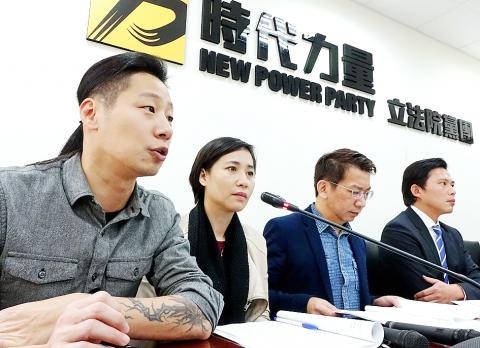The New Power Party (NPP) caucus yesterday proposed amendments to the Referendum Act (公民投票法) to lower referendum thresholds and the minimum voting age and switch to a plurality voting system.
At a post-caucus press conference, the NPP said it would modify the act to lower the signature threshold from 0.5 percent to 0.01 percent of the electorate to initiate a referendum proposal and lower the threshold to put a referendum proposal to a vote from 5 percent to 1.5 percent of the electorate.
“The Referendum Act is often described as a birdcage act, because its thresholds are set so high that it deprives people of their rights to referendum and makes referendums a tool of large parties capable of mobilizing a large number of voters,” NPP Legislator Hsu Yung-ming (徐永明) said.

Photo: Chu Pei-hsiung, Taipei Times
The party also proposed lowering the minimum voting age from 20 to 18, establishing absentee voting and shifting to a plurality voting system from the simple majority system, under which a referendum proposal is passed when more than 50 percent of eligible voters cast ballots and when more than 50 percent of the ballots cast are in approval of the proposal.
While average voter turnout is about 70 percent in Taiwan, the so-called “double-50-percent thresholds” are advantageous to opponents of a referendum proposal, because their parties can vote down a proposal simply by persuading 20 percent of the public not to vote, making the act unfair, Hsu said.
The NPP plans to revise the act to include Aborigines’ rights to be informed of and approve Aboriginal affairs, as well as allowing people to vote on modifications to territory.
NPP Legislator Kawlo Iyun Pacidal said many laws were made without taking into consideration the rights of Aborigines, and because they are minorities, the government should not resort to public votes to decide Aboriginal-related affairs, which should be determined by Aborigines themselves.
The party proposed to abolish a provision mandating the establishment of the Information and Communication Security Technology Center as an administrative institution of the Ministry of Science and Technology.
NPP Legislator Huang Kuo-chang (黃國昌) said that information security is national security, which should not be put in the hands of a low-level, semi-government body not invested with the power to investigate.
The center should not be formed as a research institute of the ministry, whose duties do not involve information security, but should be run as an independent, cyberpolice-like agency with investigative rights under the National Security Bureau or the Ministry of the Interior, Huang said.
National Cheng Kung University professor Li Jung-shian (李忠憲) said a semi-government security agency could actually harm information security, as the center’s employees are not government officials bound by government laws, meaning they might reveal sensitive data to China after they retire from the center.
“The hasty establishment of the center [as an entity run by the ministry] would only impede reformation, so the NPP proposes to abolish its establishment,” Huang said.

Taiwan has received more than US$70 million in royalties as of the end of last year from developing the F-16V jet as countries worldwide purchase or upgrade to this popular model, government and military officials said on Saturday. Taiwan funded the development of the F-16V jet and ended up the sole investor as other countries withdrew from the program. Now the F-16V is increasingly popular and countries must pay Taiwan a percentage in royalties when they purchase new F-16V aircraft or upgrade older F-16 models. The next five years are expected to be the peak for these royalties, with Taiwan potentially earning

STAY IN YOUR LANE: As the US and Israel attack Iran, the ministry has warned China not to overstep by including Taiwanese citizens in its evacuation orders The Ministry of Foreign Affairs (MOFA) yesterday rebuked a statement by China’s embassy in Israel that it would evacuate Taiwanese holders of Chinese travel documents from Israel amid the latter’s escalating conflict with Iran. Tensions have risen across the Middle East in the wake of US and Israeli airstrikes on Iran beginning Saturday. China subsequently issued an evacuation notice for its citizens. In a news release, the Chinese embassy in Israel said holders of “Taiwan compatriot permits (台胞證)” issued to Taiwanese nationals by Chinese authorities for travel to China — could register for evacuation to Egypt. In Taipei, the ministry yesterday said Taiwan

Taiwan is awaiting official notification from the US regarding the status of the Agreement on Reciprocal Trade (ART) after the US Supreme Court ruled US President Donald Trump's global tariffs unconstitutional. Speaking to reporters before a legislative hearing today, Premier Cho Jung-tai (卓榮泰) said that Taiwan's negotiation team remains focused on ensuring that the bilateral trade deal remains intact despite the legal challenge to Trump's tariff policy. "The US has pledged to notify its trade partners once the subsequent administrative and legal processes are finalized, and that certainly includes Taiwan," Cho said when asked about opposition parties’ doubts that the ART was

If China chose to invade Taiwan tomorrow, it would only have to sever three undersea fiber-optic cable clusters to cause a data blackout, Jason Hsu (許毓仁), a senior fellow at the Hudson Institute and former Chinese Nationalist Party (KMT) legislator, told a US security panel yesterday. In a Taiwan contingency, cable disruption would be one of the earliest preinvasion actions and the signal that escalation had begun, he said, adding that Taiwan’s current cable repair capabilities are insufficient. The US-China Economic and Security Review Commission (USCC) yesterday held a hearing on US-China Competition Under the Sea, with Hsu speaking on